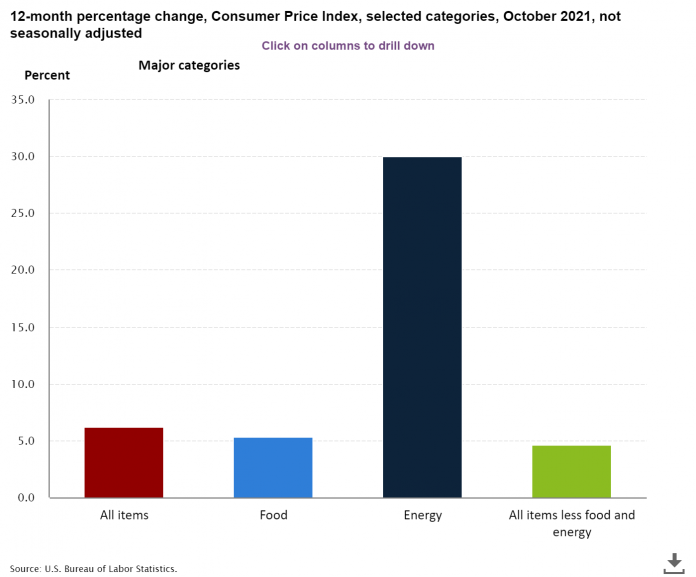(The Center Square) – The prices of everyday goods are getting increasingly more expensive, new federal data confirm.
The Department of Labor’s Bureau of Labor Statistics on Wednesday released its monthly report on the consumer price index, a key marker of inflation, which showed that consumer prices rose 0.9% in October and are currently rising at the fastest rate in decades.
“The all items index rose 6.2 percent for the 12 months ending October, the largest 12-month increase since the period ending November 1990,” BLS said. “The index for all items less food and energy rose 4.6 percent over the last 12 months, the largest 12-month increase since the period ending August 1991. The energy index rose 30.0 percent over the last 12 months, and the food index increased 5.3 percent.”
Food and energy costs have helped drive much of the price increases, making it harder for many Americans to make ends meet.
“The monthly all items seasonally adjusted increase was broad-based, with increases in the indexes for energy, shelter, food, used cars and trucks, and new vehicles among the larger contributors,” BLS said. “The energy index rose 4.8 percent over the month, as the gasoline index increased 6.1 percent and the other major energy component indexes also rose. The food index increased 0.9 percent as the index for food at home rose 1.0 percent.”
Treasury Secretary Janet Yellen told NPR’s Morning Edition Wednesday that the inflation is temporary and will level off next year, though some economists have disputed that claim.
“I expect that next year, many of the supply bottlenecks that we’re experiencing now in opening up our economy will recede,” Yellen said. “Sometime during the second half of the year, we’ll see inflation rates moving back toward the 2% that we regard as normal.”
Erik Randolph, director of research for the Georgia Center for Opportunity, disagrees, pointing to increased spending under the Biden administration as a cause for concern.
“Hoping that inflation is just transitory may be wishful thinking at this point,” Randolph said. “This October report is a warning bell for Congress and the Federal Reserve to focus on fiscal spending and monetary causes. As Congress proposes spending more on programs using debt, they are at risk of causing more financial woes and not the relief they seek.”
The inflation data has also raised concerns about the holidays, where Americans are expected to pay more for their annual holiday meals and traditions.
“Thanksgiving is right around the corner and folks can’t even find turkeys, let alone afford them,” U.S. Rep. Chip Roy, R-Texas, said. “Out of control spending is contributing to this problem. But that didn’t stop 32 Republicans from helping Democrats pass a $1.2 trillion infrastructure bill that will add a quarter trillion to the deficit.”
The Biden administration, though, has downplayed the inflation and pointed out other economic gains.
“The number of workers losing their jobs is at the lowest level since the pandemic began,” the White House said in a statement after the inflation data was released. “Unemployment claims are down 70% since January. … Our economic recovery has happened years faster than our recovery from the 2008 recession.”
Casey Harper is a Senior Reporter for the Washington, D.C. Bureau of The Center Square. Originally published by The Center Square. Republished with permission.











